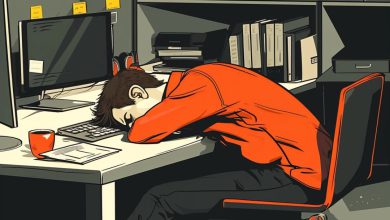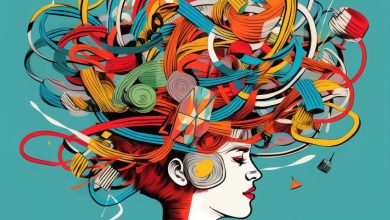Depression and Low Energy: Coping Strategies for Depression Fatigue

Are you struggling with depression and feeling tired, exhausted, and fatigued all day long?
Depression and low energy often go hand in hand, creating a challenging cycle that can significantly impact one’s well-being. Feeling exhausted after performing simple activities that would normally require minimal effort, finding it challenging to complete routine chores, and avoiding social interactions and withdrawing from loved ones are all associated with depression fatigue.
But how do you fight it?
How can you boost your energy when you’re feeling depressed?
In this article, we will share tips to enhance your mood and energy, helping you manage depression symptoms. If you constantly feel tired and believe it’s due to depression, or if you know someone who faces these challenges every day, keep reading.
Improve Your Diet for More Energy

To boost your energy levels, paying attention to your diet is essential. Here are foods and nutrition to combat feeling low energy and depression:
- Complex carbohydrates: Foods like whole grains (oatmeal, brown rice, whole wheat bread), quinoa, and legumes provide a slow and steady release of energy throughout the day.
- Fruits and vegetables: Opt for a variety of colorful fruits and vegetables, such as berries, oranges, leafy greens, and bell peppers, which are rich in vitamins, minerals, and antioxidants that support overall energy and vitality.
- Lean proteins: Include sources like skinless chicken, turkey, fish, eggs, tofu, and legumes, as they provide essential amino acids necessary for energy production and muscle repair.
- Healthy fats: Incorporate foods like avocados, nuts, seeds, and olive oil, which contain monounsaturated and polyunsaturated fats that contribute to long-lasting energy.
- Iron-rich foods: Try lean red meat, poultry, beans, lentils, spinach, and fortified cereals to support healthy blood cells and prevent iron-deficiency anemia, which can cause fatigue.
- Vitamin B12: Foods like salmon, tuna, eggs, dairy products, and fortified cereals provide this vitamin that aids in the production of red blood cells and supports energy metabolism.
- Hydration: Drinking enough water throughout the day is crucial for maintaining optimal energy levels and preventing dehydration, which can cause fatigue.
| Read More: Depression and Motivation: Coping Strategies for Lack of Motivation
Get Moving with Exercise

Regular physical activity can have a significant impact on boosting your energy levels and managing depression fatigue. Consider the following strategies:
- Engage in regular exercise, even if it’s in small increments. Aim for at least 30 minutes of moderate-intensity activity most days of the week.
- Choose activities that align with your energy levels and preferences.
- Listen to your body and adapt your exercise routine accordingly. Start with shorter durations or lower intensities if needed, gradually building up as your energy levels improve.
- Finding an exercise buddy or participating in group classes can provide motivation and support.
Try Indoor Exercises:
- Yoga: A gentle practice that combines movement, breath, and mindfulness, promoting relaxation and reducing stress.
- Pilates: Focuses on core strength, flexibility, and balance, providing a low-impact workout.
- Bodyweight Exercises: Perform exercises like squats, lunges, push-ups, and planks, which require no equipment and can be done at home.
- Dance: Put on your favorite music and dance around your living room for a fun and uplifting workout.
Or Outdoor Exercises:
- Walking: A simple yet effective way to improve mood and energy levels while enjoying the outdoors.
- Hiking: Explore nature trails and immerse yourself in the beauty of the outdoors while getting a good workout.
- Running or Jogging: An excellent cardiovascular exercise that can be done in parks, trails, or around your neighborhood.
- Cycling: Take your bike for a ride in the park or along scenic routes for an enjoyable outdoor workout.
- Swimming: If you have access to a pool or a natural water body, swimming is a refreshing full-body exercise.
Remember that any physical activity, no matter how small, is better than none. Be kind to yourself and focus on finding a routine that works for you to manage depression and low energy.
Find Low-Energy Activities to Beat Depression

When experiencing low energy levels due to depression, it’s essential to engage in activities that promote relaxation, spark joy and help you to avoid negative thoughts. Here are some simple tasks and low-energy activities for depression:
- Reading a book or listening to an audiobook
- Watching a favorite movie or TV show
- Taking a warm bath or shower
- Engaging in gentle stretching or yoga
- Journaling or writing in a diary
- Listening to calming music or nature sounds
- Coloring or doing puzzles
- Engaging in light housework or organizing your space
- Spending time with a pet
- Practicing deep breathing exercises or meditation
- Engaging in aromatherapy with soothing scents
- Doing simple crafts or knitting
- Spending time in nature, such as sitting in a park or garden
- Engaging in light gardening or tending to indoor plants
- Enjoying a cup of herbal tea or a warm beverage.
Remember, the key is to choose activities that are calming, enjoyable, and require minimal physical or mental exertion. These activities can help promote relaxation, improve mood, and gradually increase energy levels over time.
Also might be Interesting to Read…
Recharge in Nature’s Healing Presence

Harnessing the power of nature can profoundly impact your mood, energy levels, and overall well-being. Here are some simple yet powerful strategies to connect with the natural world and experience its rejuvenating effects:
- Make it a habit to spend time outdoors, whether it’s taking walks in local parks, visiting gardens, or simply sitting in a natural setting. Being in nature can provide a sense of calmness, reduce stress, and uplift your spirits.
- Engage in gardening or caring for indoor plants. The act of nurturing and observing the growth of plants can provide a sense of purpose, tranquility, and connection to the natural environment.
- While in nature, practice mindfulness by paying attention to the sounds, smells, and sensations around you. Take deep breaths, appreciate the beauty of your surroundings, and allow yourself to be fully present in the moment.
- Look for opportunities to witness the beauty and awe-inspiring aspects of nature, such as sunsets, starry skies, or breathtaking landscapes. These experiences can evoke a sense of wonder, uplift your mood, and enhance your overall well-being.
Get Some Sleep

Getting regular and restful sleep is crucial for managing depression and low energy levels. Here’s how you can improve your sleep quality and wake up feeling more energetic:
- Establish a consistent sleep routine: Go to bed and wake up at the same time every day, even on weekends. This helps regulate your body’s internal clock and promotes better sleep patterns.
- Create a sleep-friendly environment: Make your bedroom a comfortable and calming space. Keep it cool, dark, and quiet. Consider using blackout curtains, earplugs, or white noise machines to block out any disturbances.
- Limit screen time before bed: The blue light emitted by electronic devices can disrupt your sleep. Avoid using screens, such as smartphones or tablets, at least one hour before bedtime. Instead, engage in relaxing activities like reading a book or taking a warm bath.
- Practice relaxation techniques: Before bed, engage in relaxation techniques that help calm your mind and prepare your body for sleep. This could include deep breathing exercises, meditation, or gentle stretching.
- Avoid stimulants and heavy meals: Minimize the consumption of caffeine, nicotine, and alcohol, especially close to bedtime. These substances can interfere with your sleep quality. Additionally, try to avoid large, heavy meals before bedtime, as they can disrupt your digestion and lead to discomfort.
Unlock the secrets of mental health as we delve into the realm of the “Most Common Mental Health Issues in Youth.” Discover the signs, symptoms, treatments, and statistics in our comprehensive blog post.
Click to explore now!
Explore the Power of Spiritual Practices

Engaging in spiritual practices can provide solace, inner peace, and a sense of connection. Consider the following strategies:
- Set aside time for quiet reflection, meditation, or prayer. These practices can help calm the mind, reduce stress, and promote a sense of inner peace.
- Nurture your spiritual beliefs, whether through attending religious services, reading sacred texts, or engaging in rituals that hold personal significance to you.
- Participate in rituals or traditions that hold meaning for you, such as lighting candles, practicing gratitude, or creating an altar. These rituals can provide a sense of grounding and connection to something greater than oneself.
- Practice acts of kindness and compassion toward yourself and others. Engaging in selfless acts can help cultivate a sense of purpose, fulfillment, and connection to your spiritual values.
If you feel the need for additional support or guidance, consider reaching out to a spiritual leader, counselor, or therapist who can help you explore and deepen your spiritual practices.
Seek Support from Friends and Family

Surround yourself with people who understand and care about your well-being. Spending time with loved ones can provide emotional support and alleviate feelings of loneliness. Schedule outings with them that involve low-energy activities, such as going for a leisurely walk, having a picnic, or enjoying a coffee or meal together. These interactions can provide a sense of support and enjoyment.
Joining group activities or support groups specific to your interests or challenges can provide a sense of belonging and understanding. It allows you to connect with others who may be experiencing similar difficulties. If face-to-face interactions are challenging, consider joining online communities or forums where you can connect with individuals who share common experiences.
“Suggestion”
Understanding the Most Common Mental Health Disorders
HealWiser’s Last Piece of Advice
If you have implemented all these tips and are still experiencing persistent feelings of tiredness and sadness, it is important to reach out to a therapist or counselor who specializes in treating depression and low energy. These professionals can offer valuable guidance, support, and evidence-based techniques to help you effectively manage depression-related fatigue and regain your energy levels.
Share your experience with HealWiser and others in the comments section below this post.






